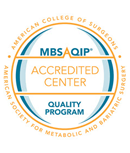Your First Nutritional Assessment
You'll be asked to complete a nutrition survey and food diary before you attend your first appointment. This allows us to tailor our discussion to your nutritional needs and challenges. We also give you an overview of nutritional expectations for the whole process, including before and after surgery, so you know what to expect. If we think you will benefit from a one-on-one session, we schedule it for four to six weeks after your initial appointment. You can also request a four to six-week follow-up appointment with the dietitian if you would like additional help with preparing nutritionally for weight loss surgery.
Before Surgery Is Scheduled
You will need to adopt new eating habits -- including the ability to follow a structured, scheduled plan -- before surgery is scheduled. We’ll cover these steps and more in the first assessment and the weeks leading up to your surgery.
Changing Your Eating Habits
Since your eating patterns may need to undergo substantial changes after surgery, we want you to start practicing now for the way you will eat after surgery. A structured, scheduled meal plan means you no longer skip meals. It also involves eating smaller, more frequent meals (every three-to-four hours) as well as chewing food well and slowly. You will be encouraged to keep a food journal and use a tracking mechanism (such as an app on your smartphone) to record what and how much you eat, the beverages you drink, and the physical activity in which you engage. This information must be submitted to us in a timely manner before surgery is scheduled, as it is part of your medical review and may be required by your insurance company.
Eliminating Alcoholic Beverages
Alcohol consumption is not recommended for at least one year following surgery. You may need to start reducing your alcohol consumption in preparation for surgery.
Getting a Grip on Social, Emotional Eating
There are many psychological, social, and emotional challenges that are closely intertwined with eating. Our behavioral health experts address these issues with you and give you the tools to help you adopt positive changes.
Eating Right Before Surgery
You will be required to follow a liver-shrinking diet for one to two weeks before your surgery date. This will make your liver smaller and keep it out of the way, which allows for safer surgery.
